
The Ultimate Guide to Braces in New Egypt
Getting braces is a significant step towards achieving a straighter and healthier smile. No matter your age, your health history, or the state of your teeth, getting braces can make you feel happier and more confident in yourself and what you offer in relationships, work, and life.
Getting braces in New Egypt requires that you educate yourself about a few things. Firstly, you need to know what braces do and what they don’t do. You need to understand what to look for when choosing your orthodontist, and you need to know the timeline and the basic asking price for braces. Central Jersey is full of orthodontists who are eager to help, but you need to be sure you are making the right choice for you and the future of your smile.
When you are starting your journey to getting braces in New Egypt, here are the things that you should keep in mind and plan for.
Initial Consultation
Finding Your Orthodontist: You are going to begin everything by finding a friendly, reliable, budget-appropriate qualified orthodontist or dentist who specializes in orthodontics. You can ask for recommendations from your regular dentist or seek referrals from friends and family.
Consultation Appointment: Next, you need to schedule an initial consultation. During this visit, the orthodontist will examine your teeth, take X-rays, and discuss treatment options. As for you, you will ask questions about the orthodontist, their experience, their plans, and how much they are going to charge too. Any questions you have should be asked at this point.
Treatment Plan and Decision-Making
Evaluation: Based on that initial examination, your orthodontist will then create a treatment plan that is tailored to your specific needs and your mouth. They will ably explain the diverse types of braces (traditional metal braces, ceramic braces, lingual braces, Invisalign) and suggest the best option for you based upon your teeth, your situation, and any issues within your mouth, such as underbite, crossbite, overbite, etc.
Costs and Duration: At this point, you’ll want to completely understand the calculated costs of treatment, how long you’ll need to wear the braces, and also any other specific details regarding care and maintenance. Think of this as Braces 101 and make sure you take down all the important information.
Preparation
Pre-Treatment Procedures: Before getting your braces installed, you might need some preparatory procedures, such as having your teeth extracted to create space or other necessary dental work. This is laying the groundwork for the braces and will ensure that they are properly placed and will give you the results that you want.
Preparation Instructions: Your orthodontist will provide instructions on how to prepare for the day you get braces, which may include avoiding certain foods or taking medications. It’s important that you aren’t nervous at this point and you really have no reason to be. The next stage in the process will be quick, and painless, and will officially have you on your way to creating the smile you have always wanted.
Getting Braces
On the day of getting braces in New Egypt, your orthodontist will clean and dry your teeth before attaching the brackets using a dental adhesive. This is a lot like a regular dental appointment. Of course, this appointment will end with you having your braces applied.
Then it’s time for the brackets to be installed into your mouth. Once the brackets are in place, a wire is threaded through the brackets and secured with elastic bands. After that, your orthodontist will make sure the braces are properly adjusted and provide instructions on care, hygiene, and what to expect.
Adapting to Life with Braces
Discomfort and Adjustments: Some people are afraid of getting braces because they fear that it’ll hurt and feel uncomfortable. And while you may experience some discomfort or just a tiny bit of soreness after getting braces, it’s really not as bad as people think. Plus, over-the-counter pain relief can help anything that you feel and your orthodontist will also give you good advice about minimizing pain and treating any sort of discomfort.
It won’t take much time until you’re feeling much, much better and more at peace with the new hardware that you have. Your mouth will gradually adjust to the braces over time. Within a few weeks, you will be completely adjusted to the new normal of having braces.
Dietary Adjustments: Keep in mind that you might need to modify your diet to avoid hard, sticky, or chewy foods that can damage the braces. For many, this is the biggest adjustment that they must make when wearing braces.
Regular Check-ups and Adjustments
The whole process isn’t over yet! After installation and some time to adjust, you will have regular appointments which typically come about every 4-8 weeks. These will be used for adjustments and check-ups. During these visits, the orthodontist will tighten the braces, change wires, and monitor progress. Any issues you have should be addressed at this time too so don’t be afraid to ask things or bring up concerns!
Maintenance: A lot of work will be up to you! You are the one in charge of making sure you’re getting the most out of your braces. You’ll need to maintain good oral hygiene by brushing and flossing regularly. Plus, your orthodontist might recommend specific tools for cleaning around the braces.
Removal and Post-Treatment
Once your teeth have shifted to the desired position, your orthodontist will remove the braces. This all depends on what your orthodontist decides based on your progress and the state of your smile. And even after the braces are off, you might need to wear a retainer to prevent your teeth from shifting back to their original positions. As always, follow your orthodontist’s instructions regarding retainer use.
Follow-Up Care
After your braces are removed by your doctor, they will continue to monitor your teeth to ensure they remain aligned correctly.
Never forget that everyone’s experience with braces can differ, and it’s essential to follow your orthodontist’s advice for the best results. If you have any concerns or experience discomfort during the treatment, don’t hesitate to contact your orthodontist. Remember, they are always there to help!
